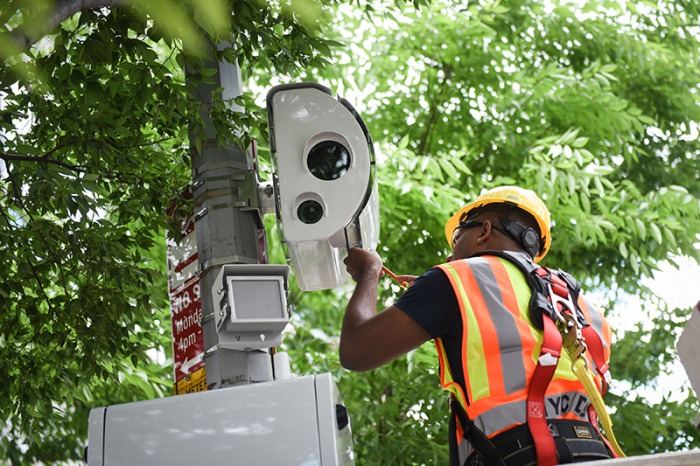
(NYC DOT Vision Zero)
May 20, 2022 By Christian Murray
The city’s speed cameras are likely to be in operation 24/7 starting July 1—now that an agreement has been struck between state lawmakers and the mayor’s office.
Mayor Eric Adams issued a statement Thursday saying that state legislators plan to introduce legislation that will permit speed cameras to be in operation 24/7, 365 days a year for another three years.
“Make no mistake about it, this is a major victory for New Yorkers that will save lives and help stem the tide of traffic violence that has taken too many,” he said in a statement.
Adams said that he has been working closely with lawmakers in Albany for months, including Assemblymember Deborah Glick (D-Manhattan) and State Sen. Andrew Gounardes (D-Brooklyn). Gounardes introduced legislation last night that will bring the change, Glick is expected to introduce a bill soon.
“I want to thank Speaker Hastie, Majority Leader Stewart-Cousins, Senator Gounardes and Assemblymember Glick, and all of my colleagues who helped us take this significant step,” Adams said.
Under the current program, the cameras are in operation from 6 a.m. to 10 p.m. on weekdays– and are turned off completely on weekends.
There are thousands of cameras across the city, which are spread across 750 school zones. Each camera is required to be within a 1,320-foot radius of a school entrance or exit. The DOT has not disclosed a map of the locations.
Advocates say that they are relieved a deal has been struck, since the cameras would have gone dark on July 1 under the current law. The cameras will now be in operation 24/7 through July 1, 2025.
The cameras take photos of drivers going more than 10 miles per hour above the speed limit and then the city mails $50 violations to the registered owner of the vehicle.
The mayor’s agreement is a partial victory, since he had been looking for the city to gain full control of the cameras as well as red light cameras. That was not included as part of the agreement.
But Adams presented the deal as a win for the city, noting that speed cameras have proven to be effective in discouraging repeat speeding behavior.
In 2021, the mayor said, the majority of vehicles that received one violation did not receive a second.
As of December 2020, he said, speeding at camera locations during hours of operation had dropped by an average of 72 percent.
Before the state can make the legislative change, the city council must sign off on it– in what’s referred to as home rule. The council is required to call on Albany to pass the bill before the legislation is put to a vote by state lawmakers.
Adams is reaching out to council leaders to make it happen.
“I now look forward to working with our partners in the city council to deliver safer streets and a safer city for New Yorkers.”
4 Comments







It’s good that I don’t drive at night
So is the rest of the neighborhood.
I have 3 dwi’s , one while picking up a prostitute on northern blvd.
Another cash grab on already strapped NY’ers. Then they wonder why no one retires here.